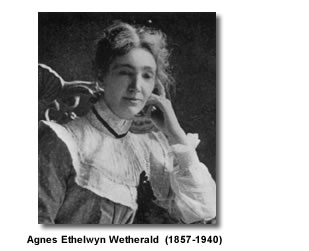AGNES ETHELWYN WETHERALD (1857-1940)
by Kemisha Newman
Though little remembered today, Agnes Ethelwyn Wetherald was for many years an active member of the Canadian literary community in the post-confederation period. She was born to English-Quaker parents in Rockwood, Ontario, where her father, William Wetherald, was the founder and principal of Rockwood Academy. He subsequently became superintendent of Haverford College, near Philadelphia. After becoming a Quaker minister, he moved the family back to Ontario, to a fruit and dairy farm on the Niagara peninsula. William was careful to nurture his daughter’s talent as a writer by imparting to her his own love of the English language and its literature. Additionally, her writing was profoundly influenced by the pastoral environments in which she spent her childhood.
Wetherald published her first poem when she was seventeen in St. Nicholas Magazine , and in the 1880s began to contribute essays and sketches to the Toronto Globe , writing under the pseudonym Bel Thistlethwaite, the maiden name of her paternal grandmother. During this period she also placed numerous poems and prose pieces in The Week, including a series of articles on Canadian literary women, and collaborated with Graeme Mercer on her only novel, An Algonquin Maiden. The novel drew sharp criticism for its unrealistic and sentimental qualities, as well as for its romanticised portrait of aboriginal life (one of its severest critics was aboriginal poet E. Pauline Johnson), and Wetherald asked that it be left out of contemporary accounts of her career. Nascent scholarly interest in early Canadian women’s writing led to its republication by U of T Press in 1973; Wetherald is thus best known today for the work from which she tried most strenuously to disassociate herself during her lifetime. In 1889, she moved to London, Ontario to become a professional journalist, writing for the London Advertiser and for a new but short-lived feminist monthly, Wives and Daughters. Wetherald was also increasingly active in American publishing circles, placing poems in Scribner’s, Outlook, The Chap-Book, and The Detroit Free Press. She worked in Philadelphia in 1895-96 as an editorial assistant on the Ladies’ Home Journal, and also held editorial positions in Hartford, CT and St. Paul, MN.
This period of journalistic and editorial activity was also very productive for Wetherald as a poet. In 1894, she placed more poems in the Boston-based periodical Youth’s Companion than any other poet, and these were later collected into her first book of poetry, The House of Trees and Other Poems in 1895. Having returned to the family farm in Ontario, she continued to produce work for young readers in Tree-Top Mornings (1921), a book of poems written for her adopted daughter Dorothy.
The first decade of the twentieth century was her most productive, and saw the publications of three books of poetry. A review of The Last Robin: Lyrics and Sonnets (1907) in The Globe said, “The salient quality of Miss Wetherald’s work is its freshness of feeling, a perennial freshness, renewable as spring. This has a setting of harmonious form, for the poet's ear is delicately attuned to the value of words, both as to the sound and the meaning.” The then Governor-General of Canada, Earl Grey commended her in a personal letter before buying twenty-five copies to distribute to his friends. As the twentieth century progressed, Wetherald’s reputation began to fall into disfavour, especially since she declined to experiment with the kinds of free verse forms and unconventional subjects that came to be expected of serious literature in the modernist period. Nonetheless, Wetherald’s best poems deserve to be included alongside the work of her better-known contemporaries, such as Bliss Carman, Archibald Lampman, and Duncan Campbell Scott, in the canon of Canadian post-Confederation literature. |



